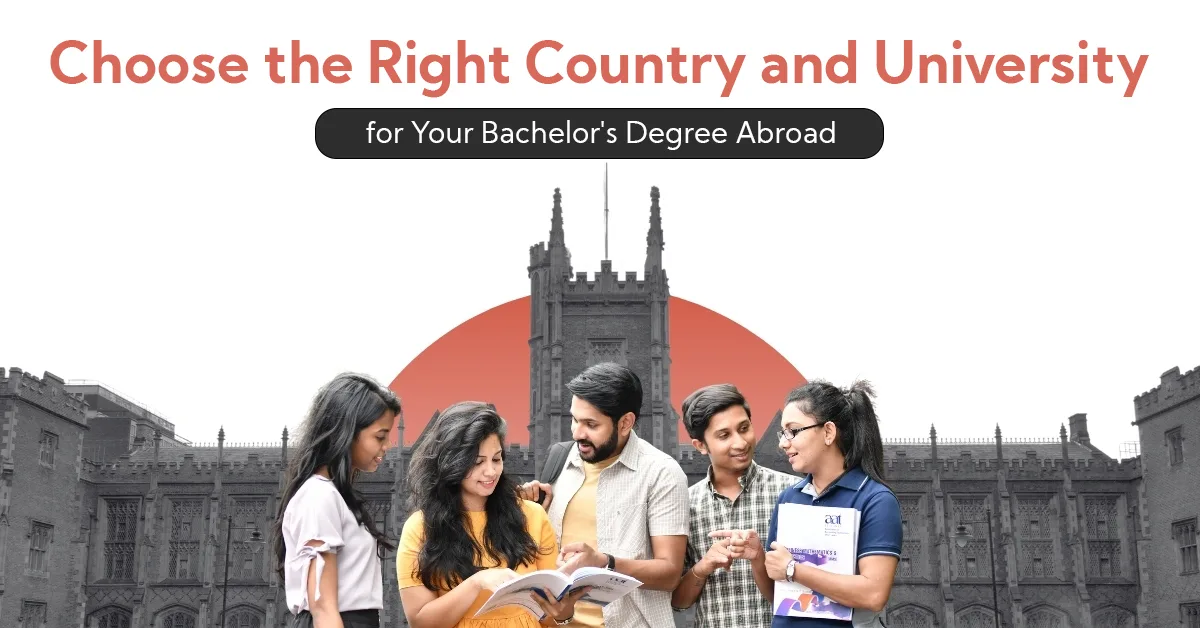Choosing where to study abroad is one of the biggest decisions a student will make. It affects your education, career, and personal growth. The options can feel too many. But don’t worry. With the right approach, you can find a path that fits you best.
This guide will help you. It breaks the process down into easy steps. It uses real tips, facts, and examples. Whether you want the top countries to study abroad, the best universities to study abroad, or you are still wondering what’s the best place to study abroad, we have you covered.
Let’s start this journey.
Academic and Career Goals
Before picking a country or school, think about your goals. Ask yourself:
- What do I want to study?
- What kind of job do I want after graduation?
- Will my degree be accepted worldwide?
- Do I want to stay abroad after I finish?
These questions matter. Your answers guide you toward the right fit. Some countries are known for science. Some focus on business or art. Some are strong in tech. Pick what matches your plan.
Match Country with Your Career
| Field | Top Countries to Study Abroad | Popular Universities |
| Engineering | Germany, USA, Canada | TU Munich, MIT, UBC |
| Business | UK, USA, Australia | LSE, Harvard, Melbourne |
| Art & Design | Italy, France, UK | Politecnico di Milano, Sorbonne |
| Computer Science | USA, Singapore, Canada | Stanford, NUS, Waterloo |
If you are unsure about which country is best for international students, don’t rush. Talk to career advisors or alumni. Your degree should open doors, not close them.
Choosing the Right Country
Now let’s look at how to choose the best place to study abroad. Start with a list. Look at each country’s:
- Language of instruction
- Safety
- Cost of living
- Culture
- Work opportunities
Here’s a quick comparison:
| Country | Language | Tuition (avg/year) | Work Hours (Student) | Culture |
| USA | English | $25,000 – $50,000 | 20 hrs/week | Diverse, fast-paced |
| UK | English | $15,000 – $35,000 | 20 hrs/week | Rich heritage |
| Germany | German/English | Free – $1,500 | 20 hrs/week | Efficient, modern |
| Canada | English/French | $15,000 – $30,000 | 20 hrs/week | Friendly, multicultural |
| Australia | English | $20,000 – $35,000 | 20 hrs/week | Laid-back, sunny |
| Netherlands | English | $8,000 – $20,000 | 16 hrs/week | Innovative, liberal |
Some of the top countries to study abroad also offer post-study work visas. This helps if you plan to work after graduation.
Scholarships to Consider (By Country)
| Country | Scholarship Name | Value | Eligibility | Website |
| USA | Fulbright | Full funding | Academic merit | https://foreign.fulbrightonline.org/ |
| UK | Chevening | Full/partial | Leadership + grades | https://www.chevening.org/ |
| Germany | DAAD | Tuition + living | Good GPA, motivation | https://www.daad.de/ |
| Canada | Vanier | $50,000/year | Research-focused | https://vanier.gc.ca/ |
| Australia | Australia Awards | Full funding | Developing countries | https://www.dfat.gov.au/ |
| Netherlands | Holland Scholarship | €5,000 | Non-EEA students | https://www.studyinholland.nl/ |
These scholarships help ease the cost. This makes many good places to study abroad more reachable.
Finding the Best Abroad University
Once you choose a country, pick a school. Don’t go by name alone. Check these factors:
- Accreditation: Is the university officially recognized?
- Programs offered: Does it offer your field?
- Rankings: Is it ranked globally or in your subject?
- Class size: Smaller classes mean more help.
- Support for international students: Do they offer help with housing, visas, and language?
The best universities to study abroad may not always be Ivy League. Many smaller universities offer better support and lower costs.
| University | Country | QS Rank 2025 | Notable Programs | Avg. Tuition |
| Harvard | USA | #3 | Law, Business, Medicine | $50,000+ |
| University of Toronto | Canada | #21 | AI, Engineering | $30,000 |
| LMU Munich | Germany | #59 | Humanities, Science | $1,500 |
| University of Melbourne | Australia | #14 | Health, Law | $28,000 |
| University of Amsterdam | Netherlands | #53 | Social Sciences | $15,000 |
| University of Edinburgh | UK | #22 | Computer Science | $25,000 |
You can find many good places to study abroad with strong programs, even if they are not in the top 10.
Costs and Financial Aid Options
Studying abroad is expensive. But you can plan smart. Costs include:
- Tuition fees
- Living expenses (rent, food, transport)
- Health insurance
- Travel costs
| Country | Tuition | Living Costs | Total |
| USA | $35,000 | $15,000 | $50,000 |
| UK | $25,000 | $12,000 | $37,000 |
| Germany | $500 | $11,000 | $11,500 |
| Australia | $28,000 | $13,000 | $41,000 |
| Canada | $22,000 | $10,000 | $32,000 |
| Netherlands | $12,000 | $10,000 | $22,000 |
To reduce costs, apply for:
- University scholarships
- Government scholarships
- Private grants
- Work-study jobs
Always check the deadlines. Many top scholarships close early.
Admission Requirements and Application Process
Each country has different rules. But most ask for:
- Your high school marks
- Language test scores (like IELTS or TOEFL)
- Statement of Purpose (SOP)
- Recommendation letters
- Passport and ID
Some may ask for SAT or ACT. Some need entrance exams. Always check the university’s website.
Timeline to Apply
| Step | Time |
| Research | 1 year before |
| Take tests (IELTS, SAT) | 10–12 months before |
| Write SOP, gather docs | 8–9 months before |
| Apply | 6–9 months before |
| Get results | 3–6 months before |
| Apply for visa | 2–3 months before |
Apply early to top schools. The best universities to study abroad often have limited seats and early deadlines.
Visa and Immigration Policies
Your student visa allows you to live and study in another country. But rules differ. You must:
- Show proof of admission
- Show you can pay for your stay
- Show good health and no crime record
Some countries let you work part-time. Others let you stay after graduation.
| Country | Student Visa Name | Work While Studying | Stay After Graduation |
| USA | F-1 Visa | 20 hrs/week | OPT (12–36 months) |
| UK | Tier 4 | 20 hrs/week | 2-year Graduate Route |
| Germany | National Visa | 20 hrs/week | 18-month job seeker visa |
| Canada | Study Permit | 20 hrs/week | Post-Graduation Work Permit |
| Australia | Subclass 500 | 48 hrs/fortnight | Temporary Graduate Visa |
| Netherlands | MVV + Residence | 16 hrs/week | 1-year Orientation Year |
Make sure to follow the visa rules strictly. It helps you stay legally and apply for work after.
Making the Final Decision (Pros and Cons)
Now you’ve done your research. You have offers. It’s time to choose.
Consider These Factors:
- Cost: Can I afford this without debt?
- Support: Will I get help adjusting?
- Location: Is the city safe and comfortable?
- Career: Will this degree help me grow?
- Quality: Is the education worth it?
Sample Decision Table
| Factor | Country A | Country B |
| Tuition | $20,000 | $10,000 |
| Living Costs | $12,000 | $9,000 |
| Work Option | Yes | Yes |
| University Rank | Top 50 | Top 100 |
| Career After | High | Medium |
| Culture Fit | Yes | Maybe |
Think about what matters most to you. You want to be happy and successful.
Conclusion
Choosing the best place to study abroad is a personal journey. It takes research, time, and thought. But when done right, it changes your life.
To succeed, match your goals with the country and university. Look at costs, scholarships, work options, and long-term growth. Don’t choose just for fame. Choose for fit. You can also contact Transglobal Overseas’ experts to identify which country is best to study abroad. We’ll help you find your ideal match.
Many students today are looking at top countries to study abroad not only for education but for experience, too. There are many good places to study abroad that offer strong support, lower tuition, and real chances to grow.
And remember, the best universities to study abroad are not always the most expensive. Sometimes, smaller schools with personal attention are where big dreams grow best.
So take a deep breath, make a list, and trust your process. Your future is out there, waiting.
Frequently Asked Questions
1. How can tuition fees and living costs affect the choice of a study destination?
Tuition and living costs can make or break your plan. If it’s too expensive, it adds stress. Countries with lower costs let you focus more on studying and less on worrying about money every day.
2. How important is the global ranking of a university when making a decision?
Rankings matter, but they’re not everything. A school might be top-ranked but not right for your field. Look for strong programs, support for students, and a learning style that fits how you grow best.
3. What are the best countries for international students based on affordability and quality of education?
Germany, Canada, and the Netherlands are great picks. They offer strong degrees, lower tuition, and safe environments. Many students say these are the top countries to study abroad without going deep into debt.
4. What are the visa requirements for popular study destinations, and how do they impact the decision?
Visa rules vary. Some places let you work or stay after graduation. Others don’t. Countries like Canada and Australia offer flexible options, which is a big plus when choosing where to study abroad.
5. What scholarships and financial aid options are available for international students?
You can apply for government, university, or private scholarships. Many cover tuition, living costs, or both. Options like Fulbright, DAAD, and Chevening help make good places to study abroad more affordable.
6. What should be checked about the university’s accreditation and recognition?
Make sure the university is officially recognized in the country and worldwide. Accreditation means your degree is trusted by employers and schools. Without it, your time and money could go to waste.
7. What factors should be considered when choosing between a public and private university abroad?
Public schools often cost less and are widely known. Private ones may offer smaller classes and special programs. Look at the support, fees, and job outcomes to see what’s best for your goals.
8. What are the best ways to research and compare universities before applying?
Visit official websites, read student reviews, and join forums. Use tools like QS or Times rankings to compare programs. Talking to alumni or attending webinars also gives real insight you won’t find online.




